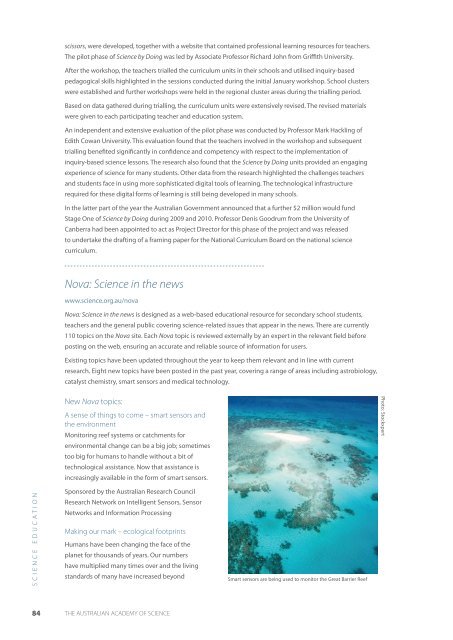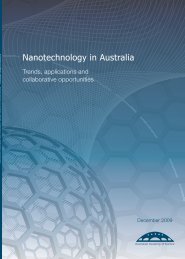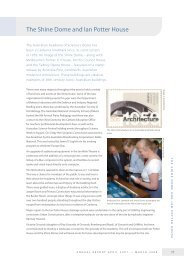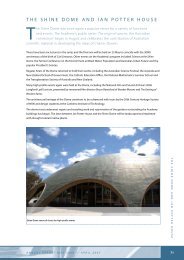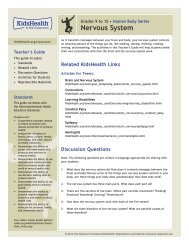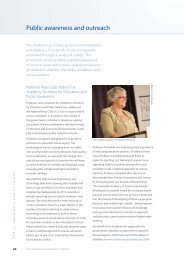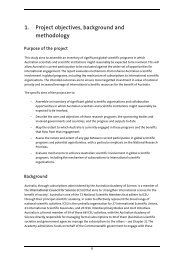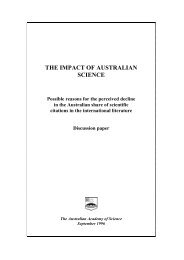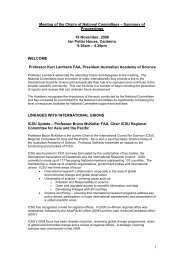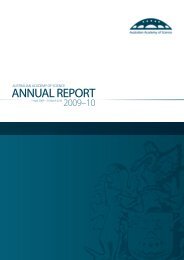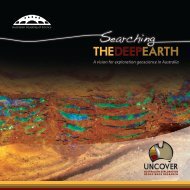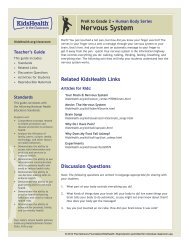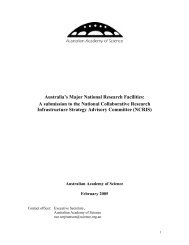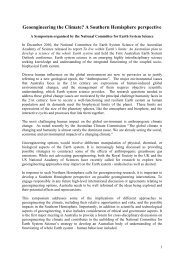full report - Australian Academy of Science
full report - Australian Academy of Science
full report - Australian Academy of Science
Create successful ePaper yourself
Turn your PDF publications into a flip-book with our unique Google optimized e-Paper software.
scissors, were developed, together with a website that contained pr<strong>of</strong>essional learning resources for teachers.<br />
The pilot phase <strong>of</strong> <strong>Science</strong> by Doing was led by Associate Pr<strong>of</strong>essor Richard John from Griffith University.<br />
After the workshop, the teachers trialled the curriculum units in their schools and utilised inquiry-based<br />
pedagogical skills highlighted in the sessions conducted during the initial January workshop. School clusters<br />
were established and further workshops were held in the regional cluster areas during the trialling period.<br />
Based on data gathered during trialling, the curriculum units were extensively revised. The revised materials<br />
were given to each participating teacher and education system.<br />
An independent and extensive evaluation <strong>of</strong> the pilot phase was conducted by Pr<strong>of</strong>essor Mark Hackling <strong>of</strong><br />
Edith Cowan University. This evaluation found that the teachers involved in the workshop and subsequent<br />
trialling benefited significantly in confidence and competency with respect to the implementation <strong>of</strong><br />
inquiry-based science lessons. The research also found that the <strong>Science</strong> by Doing units provided an engaging<br />
experience <strong>of</strong> science for many students. Other data from the research highlighted the challenges teachers<br />
and students face in using more sophisticated digital tools <strong>of</strong> learning. The technological infrastructure<br />
required for these digital forms <strong>of</strong> learning is still being developed in many schools.<br />
In the latter part <strong>of</strong> the year the <strong>Australian</strong> Government announced that a further $2 million would fund<br />
Stage One <strong>of</strong> <strong>Science</strong> by Doing during 2009 and 2010. Pr<strong>of</strong>essor Denis Goodrum from the University <strong>of</strong><br />
Canberra had been appointed to act as Project Director for this phase <strong>of</strong> the project and was released<br />
to undertake the drafting <strong>of</strong> a framing paper for the National Curriculum Board on the national science<br />
curriculum.<br />
Nova: <strong>Science</strong> in the news<br />
www.science.org.au/nova<br />
Nova: <strong>Science</strong> in the news is designed as a web-based educational resource for secondary school students,<br />
teachers and the general public covering science-related issues that appear in the news. There are currently<br />
110 topics on the Nova site. Each Nova topic is reviewed externally by an expert in the relevant field before<br />
posting on the web, ensuring an accurate and reliable source <strong>of</strong> information for users.<br />
Existing topics have been updated throughout the year to keep them relevant and in line with current<br />
research. Eight new topics have been posted in the past year, covering a range <strong>of</strong> areas including astrobiology,<br />
catalyst chemistry, smart sensors and medical technology.<br />
New Nova topics:<br />
A sense <strong>of</strong> things to come – smart sensors and<br />
the environment<br />
Monitoring reef systems or catchments for<br />
environmental change can be a big job; sometimes<br />
too big for humans to handle without a bit <strong>of</strong><br />
technological assistance. Now that assistance is<br />
increasingly available in the form <strong>of</strong> smart sensors.<br />
Photo: Stockxpert<br />
SCIENCE EDUCATION<br />
Sponsored by the <strong>Australian</strong> Research Council<br />
Research Network on Intelligent Sensors, Sensor<br />
Networks and Information Processing<br />
Making our mark – ecological footprints<br />
Humans have been changing the face <strong>of</strong> the<br />
planet for thousands <strong>of</strong> years. Our numbers<br />
have multiplied many times over and the living<br />
standards <strong>of</strong> many have increased beyond<br />
Smart sensors are being used to monitor the Great Barrier Reef<br />
84<br />
THE AUSTRALIAN ACADEMY OF SCIENCE


